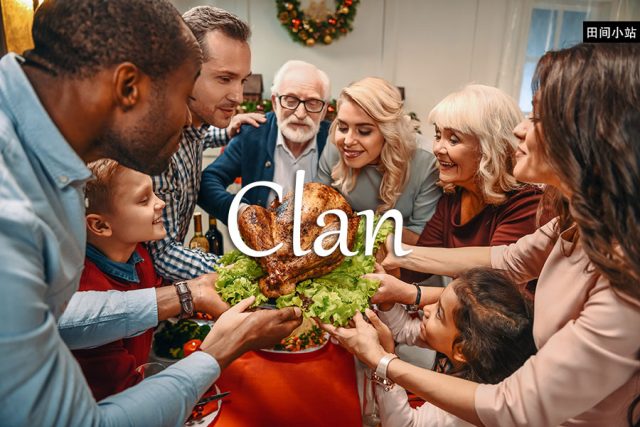本文经授权转载自微信公众号:田间小站

TOEFL TEM4 TEM8 GMAT
外刊例句
- Other observers prefer explanations that focus on the personality and skills of a mostly self-effacing, hard-working and polyglot clan.
其他分析师更倾向认为,家族内成员大多谦逊、勤奋,且精通多国语言,这些品格及能力才是成功秘诀。
——《经济学人》 - Richard Spotts, a former bureau employee, has proposed ways to handle the clan and their errant cows.
该局前雇员理查德·斯波茨提出过处理该家族及其越界奶牛的办法。
——《纽约时报》
基本释义
[noun] a close-knit group of interrelated families, especially in the Scottish Highlands
[名词] (尤指苏格兰高地的)由相互关联的家庭组成的紧密团结的群体
深入解读
Clan 是一个有些容易与 klan (三K党)相混淆的单词。该词源自拉丁语 planta (分枝),15世纪初由苏格兰盖尔语 clann (后代、家族)进入英语后,主要用来表示苏格兰高地的“宗族、氏族、家族”,多指由许多有着共同祖先的家庭组成的紧密团结的凯尔特人群体,现在也可以泛指“庞大的家族”,比如:
- 她的辈分比我小。
She ranks as my junior in the clan.
从这个概念出发, clan 常引申表示因强烈的共同利益或共同特点而团结在一起的“集团、帮派、宗派、派系”,常作非正式用语或戏谑用语使用,比如:
- 一个势力强大的实业家集团
a powerful clan of industrialists
名人名言
Friendship is held to be the severest test of character. It is easy, we think, to be loyal to a family and clan, whose blood is in your own veins.
友谊被认为是对品格最严峻的考验。我们认为,忠于一个血脉相连的家庭和宗族是很容易的。
出自美国著名医生、作家和社会改革家查尔斯·伊士曼(Charles Eastman)。
同近义词
- tribe: a social division in a traditional society consisting of families or communities linked by social, economic, religious, or blood ties, with a common culture and dialect, typically having a recognized leader
- clique: a small close-knit group of people who do not readily allow others to join them
- coterie: a small group of people with shared interests or tastes, especially one that is exclusive of other people
